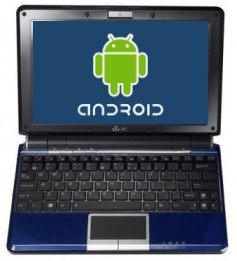 I’ve written before about Android’s potential to power a range of consumer electronics, such as set-top boxes, media players and Mobile Internet Devices (see Google’s big bet: Android beyond the cellphone). However, one product category where I think the mobile OS will have a tough time competing is the ‘traditional’ Netbook.
I’ve written before about Android’s potential to power a range of consumer electronics, such as set-top boxes, media players and Mobile Internet Devices (see Google’s big bet: Android beyond the cellphone). However, one product category where I think the mobile OS will have a tough time competing is the ‘traditional’ Netbook.
(Note: I’m referring specifically to low cost sub notebooks such as those from the likes of Asus, MSI, Dell, Acer and HP, which feature a clam shell design and typically sport a screen size of between 7 and 10 inches.)
And although that seems contradictory considering Android’s low power footprint and Linux roots, coupled with its standard-based and speedy web browser, let me explain why…
Return rates for Linux Netbook are higher than Windows XP
It isn’t, I suspect, because Linux distros are much less user-friendly (if at all), it’s because Netbook makers and retailers haven’t managed expectations. If you understand the limits of a Netbook and choice of Linux OS – can’t run Windows .exe applications and has a less familiar UI – then all is well. Otherwise, according to MSI, customers are four times as likely to demand a refund. It’s hard to see why Android would fare any better, and could possibly perform worse.
Windows has 96% share of the U.S. Netbook market
Citing figures from market research firm NPD, Microsoft has claimed that Windows’ share of the U.S. Netbook market “has ballooned from less than 10% in the first half of 2008 to 96% as of February”, reports InformationWeek. There’s no doubt that Redmond spotted the threat that Linux and the rise of the Netbook posed, responding by extending XP’s shelf life and licensing to support Netbooks.
Windows 7 is targeting Netbooks
Unlike Windows Vista, which was meant to supersede XP, the upcoming Windows 7 has a version targeted at and optimized for Netbooks. If consumers can get the most up-to-date Microsoft OS on a Netbook, presuming it does deliver a speedy and reliable performance, then again its hard to see why they’d opt for Android.
Android’s Mobile Internet Device future
Of course, I could be wrong and Android may carve itsef a respectable slice of the Netbook market. That’s the view of at least one analyst. Where I do think the Google-led OS has a much better chance of succeeding – beyond the cell phone – is the emerging Mobile Internet Device (MID) market. The leader here is, surprisingly, Apple with the iPod touch, although it’s a very nascent market overall. MIDs are typically smaller than Netbooks and often larger than a cell phone, although there is plenty of overlap. Because of this it’s not clear if the market will ever be that large, with MIDs being squeezed by smart phones on one side and Netbooks on the other.
